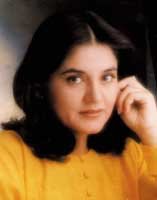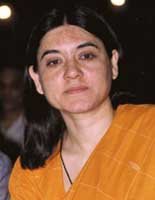
Maneka Gandhi - Solitary Sojourn
 Eighteen years after the death of Sanjay Gandhi, the issues close to his heart - environment, tree plantation, education, cleanliness, social justice - have begun getting attention, says Maneka Gandhi in her first interview in five years. After assuming office as union minister for social justice and empowerment, in the BJP-led coalition government, the "fiery" Maneka, as some call her, has been maintaining a low profile but has set an example in parliament with her dedicationn and sincerity.
Eighteen years after the death of Sanjay Gandhi, the issues close to his heart - environment, tree plantation, education, cleanliness, social justice - have begun getting attention, says Maneka Gandhi in her first interview in five years. After assuming office as union minister for social justice and empowerment, in the BJP-led coalition government, the "fiery" Maneka, as some call her, has been maintaining a low profile but has set an example in parliament with her dedicationn and sincerity.
by Hubert Vaz
HER smile was sunny than the golden streaks of sunlight filterig through the Venetian blinds... and the twinkle in her eyes seemed to compensate for the "bindi" that was absent on her forehead... but what appeared more striking about Maneka Gandhi's personality was the glamour in her simplicity which has long become a personal statement.
"I'm a very solitary person," she confesses adjusting her rust-coloured salwar khameez which is her favourite garment. "I don't think people fit only in two categories, as introverts or extroverts. I'm not an introvert but I generally prefer studying or working in my institutions and it gives me immense satisfaction," she said asserting her preference for keeping off the crowds and the limelight.
There was an unmistakable charm about her composed approach to life, though, she admits, that she has often beenn dubbed as a volatile personality and that the media has never spared an opportunity of churning up sensational headlines over her simple utterannces. And, that is what makes her scary when speaking to reporters who often go to town with something she hasn't said. Maneka has come to terms with the harsh realities of life years ago and eventhough she had the misfortune of losing the companionship of her husband when her son, Varun, was just a three-month-old infant, she qualifies to be the torchbearer of a breed that thrives and survives all odds with determination and hard work.
Maneka is aware that the media, of late, has sat up and taken note of the low profile she has been maintaining but she has chosen to keep mum on issues for the time being since her priority was "putting my own house in order". She said she had asked for the portfolio of social justice and empowerment, on being one of the two independents inducted in the union ministry, contrary to the belief that she would opt for environment.
 Ever since she took over, she has been committed to the task of improving the image and work of this ministry and has managed to get an increase in the budgetary allocation by 91 per cent. So far, she has initiated at least 53 programmes for the welfare of various sections of society and she has set a target of providing grants to at least 4,000 NGOs during the year, since her work largely involves empowerment of NGOs in welfare work. Maneka has outgrown the standard queries posed by reporters all over the country, most of whom are waiting for a slip, but in keeping with the "fiery" image that she has acquired for speaking her mind on many occasions, she also feels it is nobody's business to probe or revel in the strained relations between the two daughters-in-laws of the late Mrs. Indira Gandhi. Even if it is intended at putting distorted versions into proper perspective, she feels, "there is no perspective, why should anybody be interested in this."
Ever since she took over, she has been committed to the task of improving the image and work of this ministry and has managed to get an increase in the budgetary allocation by 91 per cent. So far, she has initiated at least 53 programmes for the welfare of various sections of society and she has set a target of providing grants to at least 4,000 NGOs during the year, since her work largely involves empowerment of NGOs in welfare work. Maneka has outgrown the standard queries posed by reporters all over the country, most of whom are waiting for a slip, but in keeping with the "fiery" image that she has acquired for speaking her mind on many occasions, she also feels it is nobody's business to probe or revel in the strained relations between the two daughters-in-laws of the late Mrs. Indira Gandhi. Even if it is intended at putting distorted versions into proper perspective, she feels, "there is no perspective, why should anybody be interested in this."
What brought Maneka into politics... was it an in-built trait, the influence of her husband's social work or the charism of her mother-in-law and the Nehru dynasty? "No," she says, curtly adding that there was no one point motivation that brought her into politics (she even wonders whether she really was "into politics"). "I never wanted to enter politics, certainly not as an end in itself The political process is very boring. But it certainly is a tool to change the world," she said quipping, "if needlework could change the world, I'd happily do needlework..." Maneka admits that she chose to be in politics, though it goes against her very persona and personality, she she found that if one wanted to do something that could be translated for the masses one had to be in politics.
"The policy planning of the nation is done through politics," she asserts. She also expressed the view that India, as of now, needs to concentrate on environmental economics, welfare and she also felt strongly about these since "they are an extension of my very personality'. Any country like India has to pass through phases of instability and so, it would not be right to attribute instability to the successive short terms of the various governments who assumed office after the descent of the Congress at the Centre, she said adding that no government has really understood the economics of India.
"There has been a great attempt to turn a happy agrarian economy into an unhappy industrial economy, hence we find ourselves in a mess," she said explaining that its easier to let people work in guilds in villages, like every other nation has done, but it was not beingdone in India. "There have been efforts to bankrupt the country by spending for projects that fulfil the ego of those who merely lay the foundation stones of these projects. And, though these projects generate about 200-odd jobs it makes millions into refugees." About 60 per cent of rural India is dependent on animals, whether for work in fields, for milk, fertilizers, for tongas etc. People spend all their earnings or take loans and purchase animals but we have practically no veterinary services available in villages, she lamented explaining why their has been a constant influx into cities after people in villages get bankrupt.
When asked what should be the criteria for selection for MPs to bring about refinement of their roles and offices, she said, "One should not make anyone a member of parliament unless he/she has held a job earlier, since he would be more disciplined and know the real value of money." To stress her point she said, "A politician who has never worked has no value for money. By working, one gets disciplined and values time. Working robs you of your ego and you get used to working in a s ystem wher e y ou give and ta ke order s and m eas ure a chi evemen t."
As of now , "0 per cent o f t he MPs have ne v er worke d in their lives. They ha ve been involved in social service but it is only an extension of politics where they are involved in inauguration of functions. Hence there is no sense of responsibility or accountability." Maneka said expressing her displeasure over the system of governance.
When asked whether she favoured a presidential form of government to the current parliamentary democracy, Maneka said it didn't matter which form of governance a country has adopted as long as it was good governance. "In a presidential form of government, you get media savvy candidates and the issues wil become vague. We have been in a semi-presidential form of government during the rule of Indira Gandhi, Rajiv Gandhi when people voted for the prime minister and not for the party. To some extent, the same has happened in the case of Prime Minister Atal Behari Vajpayee too," she said.
Stressing that a parliamentary democracy was a presidential government in disguise, Maneka said "India needs a completely new economic direction." Criticising the educationn system where emphasis is being laid on academics and not on vocational trainning. "Villagers involved in making pots could be taught how to make better pots and the skills of marketing them rather than thrusting upon them a modern education that ultimately leaves them unemployed," she asserted.
Maneka's late husband, Sanjay Gandhi, had propogated issues related to environment, tree plantation, cleanliness, education, decades ago but there were being scant attention only now, she said. "Respect for environment is not really understood inn India and it has only become a Rotary Club 'tamasha'. In fact, it is a science of life," she said. And for the vital question which was served out with hesitation, Maneka didn't seem perturbed. When asked why she did not marry again, Maneka said she merely never felt like it and got totally engrossed with her work after Sanjay's death. The fear of losing the Gadhi tag didn't matter, "every name has its own assets and drawbacks" and the fact she belonged to the illustrious Gandhi family had never been intrumental in makig things easy for her.
Then was she continuing anything left unfinished by Sanjay? "Yes, I'm continuing to do my best for the issues he stood for. I've tried to live my life in a way that he would have wanted me to. He was fond of the environment, he lived simply, he was a disciplined and hardworking person and I'm only trying to reflect those values in my life..." There seemed to be a tear in her eyes but she diverted attention from it by briskly walking across the room to a shell to admire her book on Sanjay Gandhi.